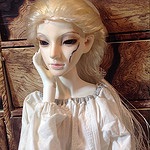Don't worry, I already know the difference between these and oil pastels, so it's not THAT question again. XD
I'll actually mostly getting these for work with polymer clay, but given that they are also used in faceups I figured there might be some good opinions here. I can't afford an extremely expensive set, but I'd like to make sure they're decent... so what are some brands I should give consideration to narrow down the search?
Preferred brands of soft pastels?
15 posts
• Page 1 of 2 • 1, 2
Preferred brands of soft pastels?
Playscale-Obsessed Mad Scientist with more cheap vinyl dolls than I'm willing to count.
Check out my 1/6 scale fabrics on Spoonflower!
http://www.spoonflower.com/profiles/playscalefabric?rec=true
Check out my 1/6 scale fabrics on Spoonflower!
http://www.spoonflower.com/profiles/playscalefabric?rec=true
-

WhiteDove01s - the walls have dolliehs
- Posts: 745
- Joined: Fri Apr 12, 2013 10:45 pm
- Location: West Virginia, USA
Re: Preferred brands of soft pastels?
I like using Nu-Pastel myself.
-

Yanagi-sen - the walls have dolliehs
- Posts: 588
- Joined: Wed Mar 31, 2010 4:25 pm
- Location: Middle of Nowhere, NW PA
Re: Preferred brands of soft pastels?
I think mine are Leow-Cornel or something similar. I might have another more pricing brand because I raided two different packs for only the colors I want but I can't tell any difference.
-

DollyKim - Dr. Dollittle
- Posts: 7790
- Joined: Sat Mar 20, 2010 3:07 pm
- Location: At the base of Mt Baldy
Re: Preferred brands of soft pastels?
I use Sennelier soft pastels - they are like butter they work so smooth  Expensive compared to many others, but very much worth it
Expensive compared to many others, but very much worth it 
-

Greyhaunt - Snarky Bitch Who Runs this Place
- Posts: 3680
- Joined: Fri Mar 19, 2010 10:32 am
- Location: the depths of hell - also known as AZ
Re: Preferred brands of soft pastels?
I love Volks Zoukei-Mura pastels----they spread and smooth so beautifully and really aren't too badly priced. ^^
-

SetsunaKou - Iz dolliehs Here
- Posts: 1913
- Joined: Sat Mar 20, 2010 3:25 pm
Re: Preferred brands of soft pastels?
I use Myungo pastels and a store brand from Hobby Lobby(before I started boycotting them) called Gallery. I have also used Blick Artist pastels, Rembrandt pastels, Richeson handmade pastels, as well as Nu Design (Prismacolor) (and a cheap-o "student" brand when I first started, but I don't count those because they were a waste of $5, no matter how many colors it came with, because they were about on par with sidewalk chalk for the amount of pigment in them). My favorite so far is the Blick pastels. You can get them open stock on dickblick.com, and they're pretty cheap as far as professional grade pastels go. They are smoother than the Rembrant pastels, and less crumbly than the Richeson, with less binder than the Myungo. However, less binder also means they break more easily, and because of the amount of pigment, they make a MESS when they fall apart. The Gallery pastels are nice enough, but are very dry. Nu Design have amazing pigment, too, but I don't have as much use for the ones in my collection, because they're a bunch of bright primary colors and only good for doing eyeshadow, as far as face-ups go.
-

OkamiKodomo - Iz dolliehs Here
- Posts: 1938
- Joined: Fri Apr 22, 2011 12:08 am
- Location: Pawtucket RI
*digging self out of RL backlog*
Hmm, I shop on dickblick.com a lot (slowly building up my premo and fimo stash), so that does sound a good place to look. And a store brand would be more in my budget. I have to admit, with most things and when I can save up for it, I'm a bit of a sucker for Staedtler products, but their pastels are out of my current budget. (My income is limited to an average $45 a month, long story.) So sounds like I might snag their store brand at least so I can get properly started on the miniatures that need to be made with polyclay.
Playscale-Obsessed Mad Scientist with more cheap vinyl dolls than I'm willing to count.
Check out my 1/6 scale fabrics on Spoonflower!
http://www.spoonflower.com/profiles/playscalefabric?rec=true
Check out my 1/6 scale fabrics on Spoonflower!
http://www.spoonflower.com/profiles/playscalefabric?rec=true
-

WhiteDove01s - the walls have dolliehs
- Posts: 745
- Joined: Fri Apr 12, 2013 10:45 pm
- Location: West Virginia, USA
Re: Preferred brands of soft pastels?
For inexpensive ones, watch the Michael's sales. Their house brand, Artist Loft, are rebranded Mungyo standard quality, so they're pretty good and low on chalk binder. (Professional quality pastels use gum arabic as the binder; student use methyl cellulose, which can be more visible.) To make Mungyos softer, pre-powder the sticks. (I've also seen Mungyo for sale at Amazon for around $12 for 48 half-sticks.)
Faber-Castell's are also pretty good (Look for the Goldfarber version.)
ETA: There is a means to filter out some of the chalk and methyl cellulose from powdered pastels to concentrate the pigment, but it's a bit involved. If you're interested, I'll write it up.
Faber-Castell's are also pretty good (Look for the Goldfarber version.)
ETA: There is a means to filter out some of the chalk and methyl cellulose from powdered pastels to concentrate the pigment, but it's a bit involved. If you're interested, I'll write it up.
Your kingdom is the earth on which you walk.
-

Czanne - i see dead dolliehs
- Posts: 53
- Joined: Tue Jan 27, 2015 8:36 am
- Location: 40th north parallel & 105 west of Greenwich
Re: Preferred brands of soft pastels?
Oh? I saw some Mungyo on Amazon, but the name and packaging made me wary. As in 'probably made in China and worried about toxins in something that is likely to get dust all over my room' wary. Guess I should go back and have a look at them again. XD
You now have my complete and utter attention. I get called the Mad Scientist for a reason, and at one point thinned my paints down to washes so I could keep 'drop by drop' color mixing charts to match doll skin tones (so far I've only made two decent matches). Saying 'A bit involved' to me is like saying 'we have free explosives' to pyromaniac.
Czanne wrote:ETA: There is a means to filter out some of the chalk and methyl cellulose from powdered pastels to concentrate the pigment, but it's a bit involved. If you're interested, I'll write it up.
You now have my complete and utter attention. I get called the Mad Scientist for a reason, and at one point thinned my paints down to washes so I could keep 'drop by drop' color mixing charts to match doll skin tones (so far I've only made two decent matches). Saying 'A bit involved' to me is like saying 'we have free explosives' to pyromaniac.
Playscale-Obsessed Mad Scientist with more cheap vinyl dolls than I'm willing to count.
Check out my 1/6 scale fabrics on Spoonflower!
http://www.spoonflower.com/profiles/playscalefabric?rec=true
Check out my 1/6 scale fabrics on Spoonflower!
http://www.spoonflower.com/profiles/playscalefabric?rec=true
-

WhiteDove01s - the walls have dolliehs
- Posts: 745
- Joined: Fri Apr 12, 2013 10:45 pm
- Location: West Virginia, USA
Re: Preferred brands of soft pastels?
Mungyo is what my (organic, no gmo in the cafeteria, always has a vegan option) k-12 school district uses. If they have toxins, they've gotten past a very toxin-sensitive, involved PTA. Yes, made in China, but with decent quality control.
To concentrate pastels, you will need a baby food jar or similar per color, several coffee filters, a funnel in which the filters fit, a mortar and pestle to grind the pastels, and both cool, soft (up to distilled is fine, but if you have soft naturally, tap works) water and 91% alcohol. Put the pastel dust in a tripled filter in the funnel, then slowly drip the water over the dust. Methyl cellulose is hydrophilic at temps between 20 and 40 C, so as the water flows through the dust, it will take some with and leave the pigment behind. A half stick usually takes about 60 ml. Discard the water (or refilter). The softer the water, the more calcium carbonate it will absorb and the more methyl cellulose it will wash. Let the filter dry without disturbing the sludge in the filter. Then repeat the process with the alcohol, going a little faster since the alcohol evaporates faster. The alcohol will dissolve any gums used as binder. Let the filter dry again and re grind the powder. It can be stored in the little jars as dust, or if you prefer pan pastels, you can reform it into cakes by mixing the dust with a few drops of 70% alcohol (sorry, I don't have good measurements on this one since you're looking for the texture of heavy school paste) and press the paste into the jar. Let dry again and you're ready to use with brushes. (And of course, run a test with a deep color you're not very fond of; there are environmental adjustments for local water, local humidity, and temps that I cannot control for. Use a deep for the test since pastel pastels are extended with fine calcium carbonate on purpose.)
To concentrate pastels, you will need a baby food jar or similar per color, several coffee filters, a funnel in which the filters fit, a mortar and pestle to grind the pastels, and both cool, soft (up to distilled is fine, but if you have soft naturally, tap works) water and 91% alcohol. Put the pastel dust in a tripled filter in the funnel, then slowly drip the water over the dust. Methyl cellulose is hydrophilic at temps between 20 and 40 C, so as the water flows through the dust, it will take some with and leave the pigment behind. A half stick usually takes about 60 ml. Discard the water (or refilter). The softer the water, the more calcium carbonate it will absorb and the more methyl cellulose it will wash. Let the filter dry without disturbing the sludge in the filter. Then repeat the process with the alcohol, going a little faster since the alcohol evaporates faster. The alcohol will dissolve any gums used as binder. Let the filter dry again and re grind the powder. It can be stored in the little jars as dust, or if you prefer pan pastels, you can reform it into cakes by mixing the dust with a few drops of 70% alcohol (sorry, I don't have good measurements on this one since you're looking for the texture of heavy school paste) and press the paste into the jar. Let dry again and you're ready to use with brushes. (And of course, run a test with a deep color you're not very fond of; there are environmental adjustments for local water, local humidity, and temps that I cannot control for. Use a deep for the test since pastel pastels are extended with fine calcium carbonate on purpose.)
Your kingdom is the earth on which you walk.
-

Czanne - i see dead dolliehs
- Posts: 53
- Joined: Tue Jan 27, 2015 8:36 am
- Location: 40th north parallel & 105 west of Greenwich
15 posts
• Page 1 of 2 • 1, 2
Who is online
Users browsing this forum: No registered users and 9 guests

